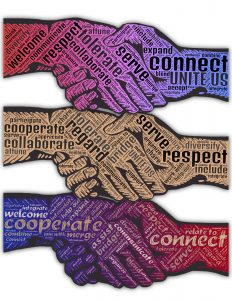Post by Lauri Aesoph, Manager, Open Education

The 2016 Open Education conference, in Richmond, Virginia, is wrapping up today. As always, this event generates and inspires new ideas for me and my colleagues at BCcampus. This year’s gathering was both familiar and different; it was a mixture of the old and new.
New People
I’ve noticed that there are more folks new to open textbooks and OER at this year’s event. This is encouraging because it means that this idea of creating and providing open educational resources at the institutional and faculty level is catching on. And it’s becoming important enough that colleges and universities, institutes and schools are spending the money to send their instructors and staff to this conference to learn.
Someone new to OER and open education hasn’t yet acquired a foundation of knowledge on this topic so they, of course, ask a lot of questions. This is a wonderful opportunity for those of us well versed in OER to teach and, as a result, clarify and refine our understanding of open education.
While attending this conference, I’ve been reminded that these new people can teach us old timers a few things. Those with new eyes see OER from a fresh perspective. When looking at OER support materials, for example, “new eyes” see the gaps or confusion in our instructions and procedures. New eyes, and minds, often draw conclusions about the OER world that the rest of us haven’t thought of. New OER converts are the “canaries in the coal mine” as they move through the OER maze trying to find their way as they challenge the rest of us on what’s missing or unclear, and help us do better work.
People with new eyes can be the innovators of this innovative movement, without knowing it. I met a professor from a Midwest community college on my flight here who described a very comprehensive OER training program for faculty that she’s spearheaded and now leads at her institution. Not only does this program educate her college’s instructors about OER, but shows them how to create a plan to adopt, adapt, and/or author OER for their classroom.
Wow!
Reinventing the Wheel
It’s gratifying to hear about all of the projects people are working on. However, it does distress me to learn that the same or similar work is taking place at different institutions, without awareness between the participants, that this is happening.
We often talk of not “reinventing the wheel” in regards to the creation of OER. Less often do we discuss applying this concept to our OER projects and plans. For instance, at BCcampus I’m responsible for maintaining the B.C. Open Textbook Collection and was very interested to learn what the Open Textbook Network Library manager and OpenSUNY manager were doing. I learned that we had some similar items on our work agenda. It seemed a shame that each of us was spending precious time and energy on tackling the same issues in isolation. So, we have started a discussion around how we can help each other lighten the load by sharing our individual ideas.
The spreadsheet, detail-oriented part of me wishes there was an easier way to systematically track all of these efforts.
The OER World Map has a goal “…to provide the most complete and comprehensible picture of the global Open Educational Resources (OER) movement. Information is collected on people, organizations, services, projects and events related to OER. ” Contributions to this tracker is, however, voluntary and therefore incomplete.
While I will certainly refer to this map often, I will continue to hunt down colleagues who are doing similar work. If open education is about sharing and collaboration, I want to make sure that I apply this philosophy to my work plan. In other words, I want to make sure that I’m not doing more than I need to if someone else has already done the work.
Seeing your Face
I’ve been working remotely for 30 years. This started out with sitting in my home office as a writer and connecting with people by phone, then — years later — fax, and finally through email. Today, online work is standard for many in the workforce. It certainly is the method I use to communicate with a broad array of individuals that I’ve never meet face-to-face.
At each Open Education conference, I get to put a face and hand shake to the email addresses I’ve been writing to for months. In my humble opinion, all of life — including work — is based on relationships. So getting to meet my at-a-distance colleagues, look them in the eye, share a meal and drink, talk about our families and lives outside of work, deepens that professional relationship and makes this work more effective and enjoyable.
Inspiration and the 5Rs
Lastly, these conferences are inspiring: nothing new here. They generate in my mind, and the minds of my BCcampus colleagues, new ideas and the fuel to continue this work throughout the year. I love to pull out business cards I’ve collected during the three days of OpenEd and remember whom I’ve talked with, and who has sparked in me a new idea, filled me with admiration for the work they’ve done, and moved me to seek out new answers to the challenges we face in British Columbia and Canada.
A conference like OpenEd is, to me, a time to recharge my OER battery and see what else I can learn. It is a remixing of ideas provoked through conversation and presentations. And once remixed, concepts about OER are often revised. And then retained, and reused throughout the year. Finally, when the following year’s Open Education conference arrives, we get to redistribute our ideas and accomplishments from the past 12 months. While, of course, looking for new eyes, old faces, and more inspiration.
